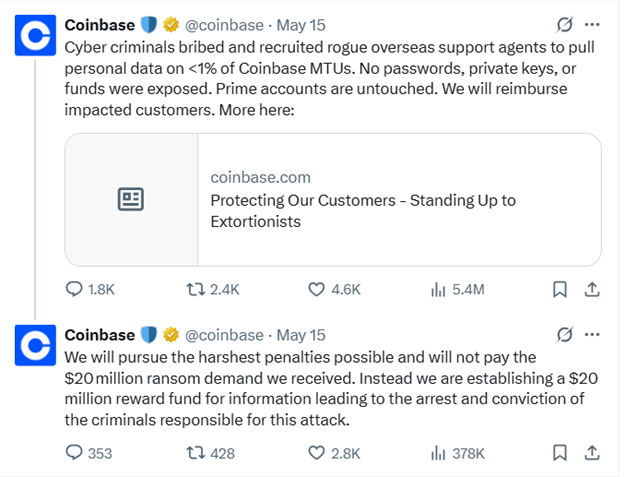 |
| By Marija Matic |
Recently, news broke of another major data breach for Coinbase, a leading centralized U.S. cryptocurrency exchange. Personal information including names, home addresses, government ID images, account balances and linked bank details were compromised.
Coinbase claims less than 1% of monthly users were affected. It also emphasized that the attackers did not gain access to users' crypto assets directly.

But this attack still revealed the notable risks of trusting a centralized platform with your sensitive information. When centralized platforms collect your sensitive personal information, they create a honeypot of valuable data. Even with the best security intentions, the reality is stark: Your information is only as secure as the weakest link in their system.
I think now is the time to have a serious conversation about protecting your digital assets and personal information. The landscape of crypto has evolved dramatically.
And there are safer alternatives to centralized exchanges. Ones that put you in control. Because whether to trust a centralized exchange or store your crypto in a wallet only you can access is no longer just about inconvenience. It's about safety.
How DeFi Solves These Problems
DeFi offers a fundamentally different approach that eliminates these risks entirely. Here are four ways you can achieve everything you want from crypto … without exposing your personal information:
1. Self-Custody, the Gold Standard: Self-custody means you control your crypto through wallets you manage.
Remember crypto’s founding axiom: Not your keys, not your coins.
2. Decentralized Exchanges (DEXes): You can now swap almost any cryptocurrency for another directly from your wallet. All without your personal data collection or the removal of your assets from your control.
And the transaction fees on DEXes are often better than on centralized exchanges, too!
3. Earning Yield Without Intermediaries: Centralized platforms offer staking opportunities. But their yields are disappointing when compared to what’s available in DeFi. And you still have to pay the platform its cut.
But with DeFi, you can target double- and even triple-digit yields with much lower fees.
4. Trading Advanced Products: Even leverage trading and futures can be done through decentralized platforms.
Perpetual protocol DEXes like Hyperliquid and GMX handle billions in daily volume. While others like Ribbon and Opyn allow crypto options trading.
You can even find synthetic assets for exposure to traditional markets.
Your DeFi Action Plan
If you're ready to take control of your crypto without sacrificing functionality, here's a step-by-step approach:
- Set up secure self-custody:
- Get a hardware wallet, like Ledger or Trezor for long-term holds. (You can read more about hardware wallets here.)
- For trading positions, you may want to consider a software wallet (more on those here).
- Back up your recovery phrases properly (offline, in safe locations).
- Consider multi-signature solutions for larger holdings.
- Get a hardware wallet, like Ledger or Trezor for long-term holds. (You can read more about hardware wallets here.)
- Move assets off centralized exchanges:
- Withdraw your crypto to your self-custody wallet.
- For maximum security, you could consider deleting your accounts on centralized platforms when you feel comfortable relying on DeFi.
- Withdraw your crypto to your self-custody wallet.
- Learn to use key DeFi protocols:
- Start with user-friendly decentralized exchanges, like Uniswap, for basic swaps.
- Graduate to lending protocols to target passive income. DeFi yields are often far more attractive than anything you’ll see in TradFi or centralized exchanges.
- Explore more complex liquidity providing strategies as you gain confidence.
- Start with user-friendly decentralized exchanges, like Uniswap, for basic swaps.
- Protect your privacy:
- Keep your crypto life separate — i.e., use different email addresses to set up DeFi accounts than you use day-to-day.
- Stay vigilant against scams. Remember, legitimate crypto customer service will never contact you first or ask for your seed phrase, private keys or passwords. Any message claiming to be "support" that reaches out unprompted is a scam.
- Keep your crypto life separate — i.e., use different email addresses to set up DeFi accounts than you use day-to-day.
- Consider privacy-focused on/off ramps:
- DeFi solutions for fiat-to-crypto conversion are catching up.
- DeFi solutions for fiat-to-crypto conversion are catching up.
For example, platforms like Bisq offer peer-to-peer Bitcoin trading with major currencies through wire transfer, Zelle, SEPA payments and more.
Though I’ll note that these platforms require careful research and due diligence before you use them.
The Bottom Line
Your crypto journey should be focused on financial freedom and opportunity, not anxiety about data breaches and personal safety.
The centralized exchange model was a necessary stepping stone in crypto's evolution. One that opened the door to mass adoption and made crypto accessible to a wider audience.
But it's becoming increasingly clear that it carries significant risks to both our assets and personal safety.
Now, DeFi has matured to the point where almost everything you might want to do with crypto can be accomplished more securely without intermediaries.
Which makes taking control of your assets through self-custody and DeFi not just an ideological choice, but a practical one.
Make the switch to self-custody today, and sleep better knowing you've eliminated an entire category of risk from your crypto strategy.
Best,
Marija Matić

